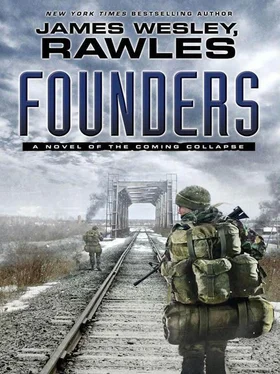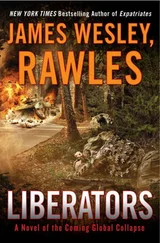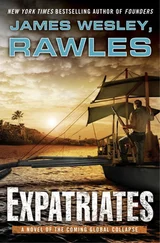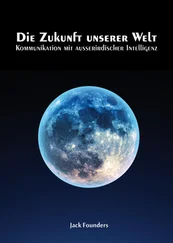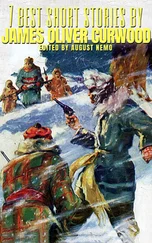James Rawles - Founders
Здесь есть возможность читать онлайн «James Rawles - Founders» весь текст электронной книги совершенно бесплатно (целиком полную версию без сокращений). В некоторых случаях можно слушать аудио, скачать через торрент в формате fb2 и присутствует краткое содержание. Город: New York, Год выпуска: 2012, ISBN: 2012, Издательство: Emily Bestler Books, Жанр: sf_postapocalyptic, на английском языке. Описание произведения, (предисловие) а так же отзывы посетителей доступны на портале библиотеки ЛибКат.
- Название:Founders
- Автор:
- Издательство:Emily Bestler Books
- Жанр:
- Год:2012
- Город:New York
- ISBN:978-1-4391-7282-7
- Рейтинг книги:5 / 5. Голосов: 1
-
Избранное:Добавить в избранное
- Отзывы:
-
Ваша оценка:
- 100
- 1
- 2
- 3
- 4
- 5
Founders: краткое содержание, описание и аннотация
Предлагаем к чтению аннотацию, описание, краткое содержание или предисловие (зависит от того, что написал сам автор книги «Founders»). Если вы не нашли необходимую информацию о книге — напишите в комментариях, мы постараемся отыскать её.
Founders — читать онлайн бесплатно полную книгу (весь текст) целиком
Ниже представлен текст книги, разбитый по страницам. Система сохранения места последней прочитанной страницы, позволяет с удобством читать онлайн бесплатно книгу «Founders», без необходимости каждый раз заново искать на чём Вы остановились. Поставьте закладку, и сможете в любой момент перейти на страницу, на которой закончили чтение.
Интервал:
Закладка:
“Insurance?”
“Yeah, an insurance policy for my family to keep at home. Just in case another joker like Maynard Hutchings ever pops up.”
Brent let out a breath. “God forbid that should happen in our lifetimes, or in our children’s.”
28. New Guards for Future Security
“If the representatives of the people betray their constituents, there is then no resource left but in the exertion of that original right of self-defense which is paramount to all positive forms of government, and which against the usurpations of the national rulers may be exerted with infinitely better prospect of success, than against those of the rulers of an individual State. In a single State, if the persons intrusted with supreme power become usurpers, the different parcels, subdivisions, or districts of which it consists, having no distinct government in each, can take no regular measures for defense. The citizens must rush tumultuously to arms, without concert, without system, without resource; except in their courage and despair.”
—Alexander Hamilton, writing as Publius, The Federalist Papers , Number 28Fort Knox, Kentucky
Mid-July, the Fourth Year
The UN’s own barbed wire internment camps made a convenient place to put the UN soldiers while they were waiting to go home. It took more than a year to send the UN forces back to Europe by ship and airplane. All of their vehicles, aircraft, and weapons stayed in the United States. This caused nearly as much acrimony as the reparations and the delays in returning their troops.
The Europeans chafed at being billed for the demobilization and troop transport. The “return bounty” reparation was fifty ounces of gold per enlisted soldier, 200 ounces per officer, and 500 ounces per civilian administrator, payable before delivery.
Recognizing that the foreign troops would soon be out of the United States, the RCG scrambled to reestablish NORAD and its nuclear deterrent. Trident missile submarines returned to port, and the nuclear missile silo LCCs at Malmstrom AFB were remanned.
Maynard Hutchings spent seven months in hiding in Brussels. He committed suicide just before his scheduled extradition hearing. Most of his civilian staff and a few divisional and brigade commanders were eventually extradited from Europe, given trials, and shot. Hundreds of lower-ranking military officers and local quislings were arrested and similarly put on trial. Sentences included head shavings and brandings. In a few rare cases, there were death sentences.
Only a few UN troops who professed fear of retribution if they were returned to their home countries were granted asylum. Each of these individuals was given a separate hearing by the RCG. Most of them eventually bought citizenship.
The first elections since before the Crunch were held in all fifty states in the November following the federal surrender at Fort Knox. The Constitution Party and Libertarian Party candidates won in a landslide. A former Wyoming governor—a Libertarian—was elected President. Based on rough population estimates, the new House of Representatives had just ninety seats.
There was a new emphasis on personal liberty at all levels of government. Under the RCG, elected representatives trod lightly, fearing the wrath of their constituents. There was a clear demotion of the federal government and a simultaneous resurgence of State Sovereignty. It became the norm to again use capital letters for the words “State” and “Citizen.” The terms “resident,” “taxpayer,” and “individual” were stricken from many laws and replaced by the word “Citizen,” always with a capital C.
In the three years following the elections, there were nine Constitutional amendments ratified by the state legislatures in rapid succession. The document went through some major changes.
The 28th Amendment granted blanket immunity from prosecution for any crimes committed before or during the Second Civil War to anyone who actively fought for the Resistance.
The 29th Amendment repealed the 14th and 26th amendments. It also made full state Citizenship a right of birth, applicable only to native-born Citizens who were the children of Citizens. It allowed immigrants to buy state citizenship. It clarified “United States citizenship” as having effect only when state Citizens traveled outside the nation’s borders, and outlawed titles of nobility such as “esquire.”
The 30th Amendment banned welfare and foreign aid, removed the United States from the UN and most foreign treaties, capped federal spending at 2 percent of GDP, capped the combined number of foreign troops in the fifty states and on federal territory at 1,000 men, and limited the active duty federal military to 100,000 men, except in time of declared war.
The 31st Amendment amplified the 2nd Amendment, confirming it as both an unalienable individual right and as a state right, repealed the existing federal gun control laws, preempted any present or future state gun control laws, and reinstituted a decentralized militia system.
The 32nd Amendment repealed the 16th Amendment, and severely limited the ability of the federal government to collect any taxes within the fifty states. Henceforth, only tariffs, import duties, and bonds could fund the federal government’s budget.
The 33rd Amendment outlawed deficit spending, put the new United States currency back on a bimetallic gold and silver standard, and made all currency “redeemable on demand.”
The 34th Amendment froze salaries at $6,000 a year for House members and $10,000 for senators, limited campaign spending for any federal office to $5,000 per term, and repealed the 17th Amendment, returning senators to election by their state legislatures.
The 35th Amendment restored Common Law and invalidated most federal court decisions since 1932, and clarified the inapplicability of most federal statutes on state Citizens in several states.
The 36th Amendment reinstated the allodial land title system. Under a renewed federal land patent system the amendment mandated the return of 92 percent of the federal lands to private ownership through public sales at one dollar in silver coin per acre.
The nation’s economy was slowly restored. But with the nine new amendments, the scope of government—both state and federal—was greatly reduced from its pre-Crunch proportions. Small government was almost universally seen as good government. For the first time since before the First Civil War, it became the norm to again refer to the nation plurally as “these United States,” rather than singularly as the United States. The change was subtle, but profound.
29. To Dust
“The moment the idea is admitted into society that property is not as sacred as the law of God, and that there is not a force of law and public justice to protect it, anarchy and tyranny commence. If ‘Thou shalt not covet’ and ‘Thou shalt not steal’ were not commandments from Heaven, they must be made inviolable precepts in every society before it can be civilized or made free.”
—John Adams, A Defence of the Constitutions of the United States Against the Attack of M. Turgot , 1787Fife, Montana
August, the Fourth Year
As the ProvGov capitulated, there were a few UN army units and “contractors” who went renegade and refused to lay down their arms. Without support from the crumbling Fort Knox government, the holdout units were increasingly demoralized, depleted logistically, and hemmed in by steadily growing resistance forces.
The remnants of García’s Force Two Associates gang was by then down to just twenty-three men and fourteen camp followers. The Resistance killed his friend Tony, who had been with him since the beginning. This was when they were looting the town of Lame Deer, Montana. The F2 gang had moved into Montana two weeks earlier, hoping that the lower population density would mean they’d meet less organized opposition. But instead the Resistance seemed only stronger and better organized. The F2 gang was reduced to making a few nighttime raids for food and fuel, and laying up each day in parklands or at abandoned ranches. No longer able to bluff their way into towns under color of law, they avoided being seen in all but the smallest towns.
Читать дальшеИнтервал:
Закладка:
Похожие книги на «Founders»
Представляем Вашему вниманию похожие книги на «Founders» списком для выбора. Мы отобрали схожую по названию и смыслу литературу в надежде предоставить читателям больше вариантов отыскать новые, интересные, ещё непрочитанные произведения.
Обсуждение, отзывы о книге «Founders» и просто собственные мнения читателей. Оставьте ваши комментарии, напишите, что Вы думаете о произведении, его смысле или главных героях. Укажите что конкретно понравилось, а что нет, и почему Вы так считаете.
